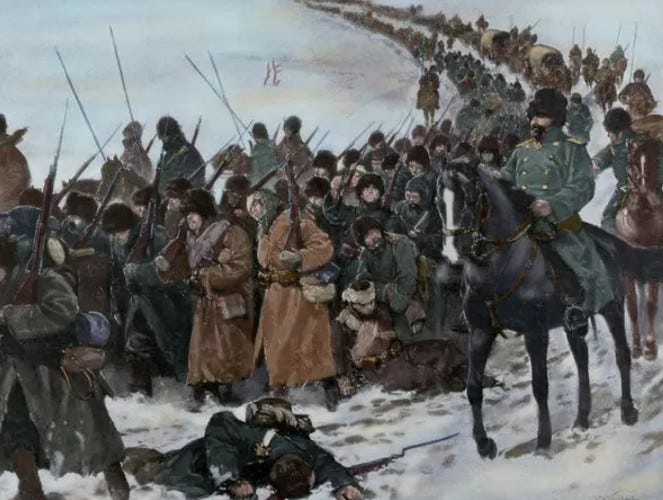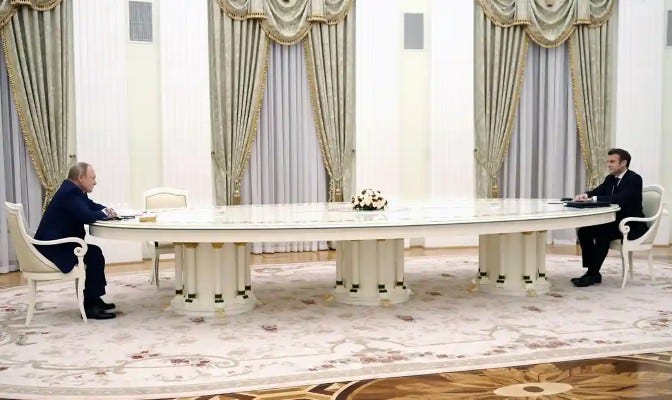Russia Has Had Its Dick Caught In Basically This Same Beehive Before
It was called the Russo-Japanese War

***NOTE: I’m not a historian or expert or person who should be talking about anything, ever. I read things, summarize them, and add jokes — it’s sort of a Doris-Kearns-Goodwin-meets-Henny-Youngman-if-neither-had-talent situation. Virtually everything in this article is taken from “The Tsar and the Tsunami” by Jordan M. Peters, “The Russo-Japanese War: Complete History of the Conflict” by Sydney Tyler, Kenneth Andres’ article in “Medium”, and Mike Duncan’s “Revolutions” podcast.***
See if you can spot anything not weird about this photo:
That was a trick question: Everything about that photo — which is of the room where Vladimir Putin conducts diplomacy — is weird. Negotiating across a Siberia-sized white marble table means that, in a way, everything you say will be translated as “I have a small penis”. The mega-table is a juvenile ploy straight out of Jack Donaghy’s Negotiate to Win course, and speaking to your negotiating partner from that far away makes about as much sense doing sex talk during tennis. I’d describe the room’s decorating aesthetic as “Johnny Winter and Marie Antoinette design a whorehouse”, and I’d bet that some master woodworker spent the better part of a decade earning kid-with-a-lemonade-stand-level wages making that beautiful inlay floor that they’ve covered with a rug.
But surely the most notable thing about that room is that — according to diplomat Fiona Hill — it contains four statues: Peter the Great, Catherine the Great, Alexander the Great, and Nicholas the…well, not “great”, but Nicholas-The-One-Who-Didn’t-Get-Killed-By-The-Bolsheviks.1 The message Putin is sending is about as subtle as a $2 bottle of wine: He belongs among the great leaders in Russian history.
Putin is a student of history. He’s not a good student — I’d give his 5,000 word essay about how Russians and Ukrainians are one people a D-minus, and it looks like most Ukrainians would give it an F — but he’s aware of history. His opinions and goals seem to be filtered through a historical lens. So, he surely has opinions about how the Ukraine War is similar to and different from Russian conflicts in Afghanistan, Hungary, and Crimea, to name a few. But the conflict that really jumps out at me in terms of similarity is the Russo-Japanese War. It was a conflict that few people saw coming and in which Russia’s grandiose ambitions were smashed against the harsh reality of their lower-than-thought standing in the world. It sparked a crisis in Russia that set the stage for the Bolshevik Revolution. I think it contains lessons for the current conflict, and not all of them are good news.



